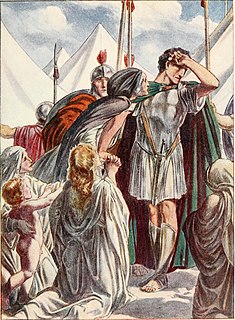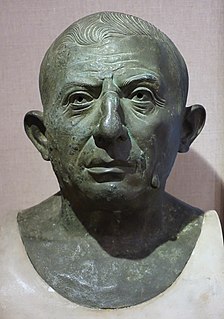
The gens Fabia was one of the most ancient patrician families at ancient Rome. The gens played a prominent part in history soon after the establishment of the Republic, and three brothers were invested with seven successive consulships, from 485 to 479 BC, thereby cementing the high repute of the family. Overall, the Fabii received 45 consulships during the Republic. The house derived its greatest lustre from the patriotic courage and tragic fate of the 306 Fabii in the Battle of the Cremera, 477 BC. But the Fabii were not distinguished as warriors alone; several members of the gens were also important in the history of Roman literature and the arts.
Gaius Trebonius was a military commander and politician of the late Roman Republic, who became suffect consul in 45 BC. He was an associate of Julius Caesar, having served as his legate and having fought on his side during the civil war, and was among the tyrannicides who killed the dictator.
Quintus Pedius was a Roman who lived during the late Republic, and, early Empire. He was the son of a Marcus or Quintus Pedius, and a nephew or grandnephew of the dictator Julius Caesar, by one of his sisters.

The gens Pompeia was a plebeian family at ancient Rome, first appearing in history during the second century BC, and frequently occupying the highest offices of the Roman state from then until imperial times. The first of the Pompeii to obtain the consulship was Quintus Pompeius in 141 BC, but by far the most illustrious of the gens was Gnaeus Pompeius, surnamed Magnus, a distinguished general under the dictator Sulla, who became a member of the First Triumvirate, together with Caesar and Crassus. After the death of Crassus, the rivalry between Caesar and Pompeius led to the Civil War, one of the defining events of the final years of the Roman Republic.
Quintus Fabius Q. f. M. n. Maximus Gurges, the son of Quintus Fabius Maximus Rullianus, was consul in 292, 276, and 265 BC. After a dissolute youth and a significant military defeat during his first consulate, he was given the opportunity to salvage his reputation through the influence of his father, and became a successful general, eventually holding the highest honours of the Roman state. He was slain in battle during his third and final consulate.

The gens Marcia, occasionally written Martia, was one of the oldest and noblest houses at ancient Rome. They claimed descent from the second and fourth Roman Kings, and the first of the Marcii appearing in the history of the Republic would seem to have been patrician; but all of the families of the Marcii known in the later Republic were plebeian. The first to obtain the consulship was Gaius Marcius Rutilus in 357 BC, only a few years after the passage of the lex Licinia Sextia opened this office to the plebeians.
Gaius Caninius Rebilus, a member of the plebeian gens Caninia, was a Roman general and politician. As a reward for devoted service, Julius Caesar appointed him consul suffectus in 45 BC.
Quintus Fabius Maximus Eburnus was a Roman statesman of the patrician gens Fabia. He was consul in 116 BC.
Quintus Fabius Maximus Allobrogicus, was a Roman statesman and general who was elected consul in 121 BC. During his consulship he fought against the Arverni and the Allobroges whom he defeated in 120 BC. He was awarded a triumph and the agnomen Allobrogicus for his victory over the Gauls.
The gens Terentia was a plebeian family at ancient Rome. Dionysius mentions a Gaius Terentilius Arsa, tribune of the plebs in 462 BC, but Livy calls him Terentilius, and from inscriptions this would seem to be a separate gens. No other Terentii appear in history until the time of the Second Punic War. Gaius Terentius Varro, one of the Roman commanders at the Battle of Cannae in 216 BC, was the first to hold the consulship. Members of this family are found as late as the third century AD.
Quintus Fabius Maximus Gurges was Roman consul in 265 BC, and died of wounds received in battle at Volsinii, where he had been sent to help put down a revolt. There is some uncertainty as to his identity.

The gens Minucia was an ancient Roman family, which flourished from the earliest days of the Republic until imperial times. The gens was apparently of patrician origin, but was better known by its plebeian branches. The first of the Minucii to hold the consulship was Marcus Minucius Augurinus, elected consul in 497 BC.
Lucius Sempronius Atratinus was a Roman politician who was elected suffect consul in 34 BC. He is mentioned in Pro Caelio, a famous speech in defense of Marcus Caelius Rufus by Marcus Tullius Cicero.

The gens Caecilia was a plebeian family at ancient Rome. Members of this gens are mentioned in history as early as the fifth century BC, but the first of the Caecilii who obtained the consulship was Lucius Caecilius Metellus Denter, in 284 BC. The Caecilii Metelli were one of the most powerful families of the late Republic, from the decades before the First Punic War down to the time of Augustus.

Lucius Marcius Philippus was a Roman politician who was elected suffect consul in 38 BC. He was step-brother to the future emperor Augustus.
Gnaeus Pompeius (Rufus) was suffect consul in 31 BC, during the transitional period when Octavian, the future Augustus, was consolidating his powers as princeps.
The gens Rutilia was a plebeian family at ancient Rome. Members of this gens appear in history beginning in the second century BC. The first to obtain the consulship was Publius Rutilius Rufus in 105 BC.

The gens Plautia, sometimes written Plotia, was a plebeian family at ancient Rome. Members of this gens first appear in history in the middle of the fourth century BC, when Gaius Plautius Proculus obtained the consulship soon after that magistracy was opened to the plebeian order by the lex Licinia Sextia. Little is heard of the Plautii from the period of the Samnite Wars down to the late second century BC, but from then to imperial times they regularly held the consulship and other offices of importance. In the first century AD, the emperor Claudius, whose first wife was a member of this family, granted patrician status to one branch of the Plautii.